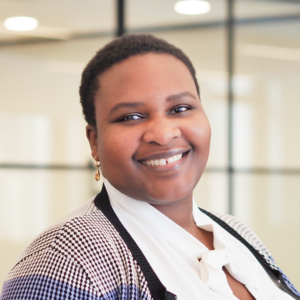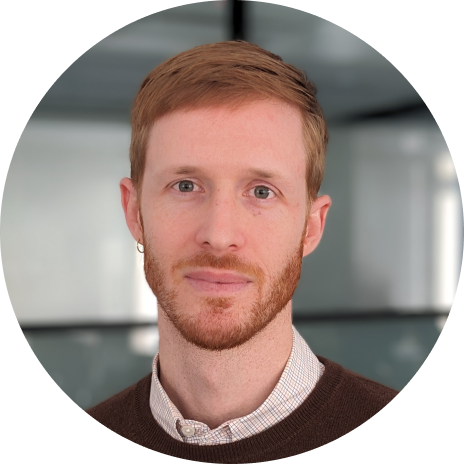Catching up with Lisa-Marie Pierre, Ph.D., Executive Director at Founder Forward.
For the second installment in our Alumni Spotlight series, we invited Luminary Labs alumna Lisa-Marie Pierre, Ph.D., to share some of her favorite Luminary Labs memories and describe her current work at the intersection of innovation and community development.

Lisa-Marie Pierre, Ph.D., Executive Director at Founder Forward.
Lisa-Marie worked at Luminary Labs as a Senior Open Innovation Associate from 2021 to 2023, supporting projects across our future of work and education and infrastructure portfolios. Her experience designing and implementing teacher professional development and ecosystem-building programs such as CTE CyberNet and the Middle Grades CTE Accelerator — and designing and leading the first year of Luminary Labs’ own work-based learning program — helped her hone a lifelong passion for nurturing people and communities to spur innovation. She also played a key role in our work supporting the Economic Development Administration’s Build Back Better Regional Challenge, a once-in-a-generation opportunity for America to rethink infrastructure. Today, Lisa-Marie is the Executive Director of Founder Forward, a 501(c)(3) organization that works with underrepresented founders to advance equity and access in the entrepreneurship ecosystem.
Our conversation with Lisa-Marie spanned topics, from Luminary Labs memories to reflections on her work leading a nonprofit organization. She described her experience adapting to a collaborative team and talked about the immense opportunities to strengthen local economies by investing in underrepresented founders.
Tell us about a favorite Luminary Labs memory.
I actually have two. I had a little metal tin cup that I used in the office. One day, I put it in the dishwasher and then left for the weekend. When I came back to the office, the cup was on my desk; someone in the office had put it there. I was like, “Wait, how did they know this was my cup?” That’s just a small memory, but to me, that describes the love language at Luminary Labs — really caring for people. That moment made me feel good. Thoughtful and considered — that’s one of the company’s values.
Another memory is all the work we did on the work-based learning program. As part of our ED ARPA contract, we hired two high school students to serve as Junior Associates on our team for the summer. Working with the team to decide how to design the student experience really felt creatively stimulating. I remember that one of the participating students initially said she didn’t want to go to college. Her plan was to do a trade or work in insurance because she did not think college was for her. Toward the end of the program, I was so proud when she let me know she decided to apply to college. She shared that interacting with everyone at Luminary Labs and seeing the diverse backgrounds on our team inspired her to apply. She got in with a full scholarship. It was a true testament to the career and technical education (CTE) projects I was working on. I got to witness firsthand what can happen when you offer people work-based learning. It just shows you what happens when you pay it forward.
What is something you learned at Luminary Labs that you continue to value today?
The importance of a thoughtful onboarding process. Luminary Labs was my second job after I graduated from my Ph.D. program. At my first job, I was just thrown in. It was just like, “go off and do the job.” But at Luminary Labs, there was such a thoughtful process in place to help me learn about the projects, learn about operations, and it was well-paced. I’ve kept this in mind at the nonprofit organization that I’m at now, Founder Forward.
Another thing I learned is collaboration. I’m now very comfortable working on teams, because for the longest time, I was in my graduate program, doing very lonely, isolating work. At Luminary Labs I learned the value of having other people give feedback and the value of working on things together. I’m excited to continue to expand Founder Forward’s team and I’m grateful to have recently brought on one other thought partner. I really value feedback, and working with a team, you can always go further.
Can you tell us more about what you are working on right now?
I am the Executive Director at Founder Forward, one of the ten philanthropic initiatives of Libra Philanthropies. Founder Forward’s programming helps Black, Indigenous, and other diverse founders gain access to funding and professional advising. We focus on overlooked regions and nondominant startup markets that do not often receive venture capital investment, loans, and grants. In under six weeks, our community of founders receive group advising from industry professionals and then work one-on-one on an urgent business problem. They also receive unrestricted funding from us — which is important — because a lot of times, funding comes with strings attached, and in the populations we’re working with, that can be a barrier. We give anywhere from $5,000 to $10,000 in unrestricted funding. We know that a lot of innovation comes from these communities, and I really want to support those founders.
We’re currently finalizing a three-year strategic plan to address the evolving needs of the entrepreneurial ecosystem. At Luminary Labs, I learned that I am a strategist. I still put on my consultant hat to think about the future of entrepreneurship and innovation in the ecosystem.
What’s the most exciting thing about your current work?
I think for me, what’s most exciting is the opportunity to take an innovative approach to supporting founders, and to dream, build, and collaborate on an issue I’m passionate about. There are so many policies and barriers that prevent Black, Indigenous, and women founders from seeing their full potential. There’s so much we can do to fight against that and promote more inclusive economies.
Recently I was speaking with a founder, a white man, and he had a really good business idea. He mentioned how he was able to jump-start his business with over $200,000 he raised just from friends and family, enabling him to access more VC funding. I thought that was really interesting, because a lot of the founders we work with also have really great business ideas and innovations, but they do not have access to that kind of capital; for them, that kind of initial funding would be a game changer. What could our community of founders do with more resources?
If you spur economic growth and opportunity, it impacts so many other issues that are going on in our communities, like displacement and gentrification. If a local business owner has money and funds, they will stay in their community, their kids will go to local schools. There is a ripple effect that ties into workforce development and economic development. So, that’s something that I think about.
Even from a young age, I enjoyed bringing people together and building community. When I came to Luminary Labs and learned about open innovation, I realized I’ve been doing that my whole life, I just didn’t have the words and the language for it. I’ve always been interested in network-building and ecosystem development, and this is such an exciting part of my work.
Is there anything you’ve recently read, seen, or listened to that you would like to recommend to our readers?
I was trying to think about this, because I’m always in a rabbit hole. Sometimes, there comes a time when you need to just sit with all the stuff you’ve gathered. I try to remind myself that it’s okay to just sit with the stuff that you have instead of always finding, finding, finding, finding. That’s something I learned in my Ph.D. program. My advisor said, “at some point, you’ve got to stop reading.”
That said, I do have a recommendation. I’ve known about the sci-fi novel “Dune” for a long time, but I finally read the first book and I’m now reading the second. I also got very interested in the author, Frank Herbert. I learned that the inspiration for “Dune” came from his environmental research, which informed the world-building he does in the novel. That really inspired me to think about the research that I’ve done and how I can connect it to storytelling. I learned about “Dune” from the footnotes of another great book, “Emergent Strategy” by Adrienne Maree Brown. So, I’ll tie those two recommendations together.
Tell us about something that brings you joy.
Being in nature. I went to the total eclipse in Arkansas this spring. Seeing the eclipse really brought me joy, because it’s something I’ve always wanted to do. I can’t even put into words what it felt like, but it was a reminder that nature is pretty cool, and has a lot of answers. A lot of things I think about in terms of ecosystems, networks, community-building … the lessons and answers are in nature. Now I think I’m an eclipse chaser. I’m trying to go to North Africa in 2027. It’s a new obsession.
I’ve noticed that when I stop reading, and then I go take a walk, or I go for a swim, or whatever, all the ideas come to me. Maybe that could be an inspiration for people. When you stop to be still, or when you do something that brings you joy, ideas will come.


